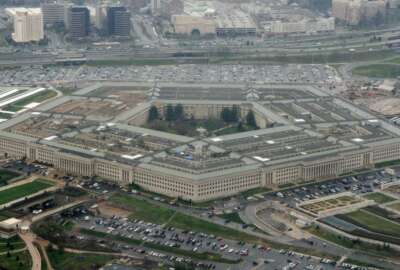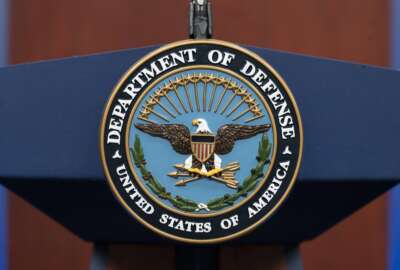Hubbard Radio Washington DC, LLC. All rights reserved. This website is not intended for users located within the European Economic Area.
On Air: Federal News Network
Trending:
Insight into the weird situation of the hospitalized Defense Secretary
Washington, and much of the nation, has been scratching its collective head over the case of Lloyd Austin. The Secretary of Defense was hospitalized with major ...
Washington, and much of the nation, has been scratching its collective head over the case of Lloyd Austin. The Secretary of Defense was hospitalized with major surgery followed by complications. Yet the White House didn’t know for nearly a week. For what might have been going on and what should have, the Federal Drive with Tom Temin spoke with Ezra Cohen, a Hudson Institute adjunct faculty member and former Defense Department and National Security Council official.
Interview Transcript:
Tom Temin And more than a staff member, you were acting deputy secretary of defense.
Ezra Cohen Acting undersecretary of defense for intelligence.
Tom Temin Okay, well, when the secretary of defense is incapacitated, what’s supposed to happen here?
Ezra Cohen Uh, well. Well, Tom, first of all, I think it goes without saying that, uh, you know, everybody hopes that, the Secretary of Defense has a full recovery and that his health improves. It is standard practice within the Department of Defense that if an official assistant secretary of defense or above, which is several levels below the secretary is out for even one day on vacation, that they sign a letter delegating their authority to their deputy. And this is something that is quite routine, something I personally had to do when I just had to take a day off for personal reasons.
Tom Temin And so in the case of the actual secretary, then it is the number two person in the Defense Department that receives that letter.
Ezra Cohen That’s right. The order of succession, which is, also something that is preset, would go to the deputy secretary of defense. However, if the deputy secretary was also unavailable it would then could go down several levels below that, depending on the circumstances. It’s really important for people to understand this is something that is preset. And this is a very regimented process, because we need to be prepared as a country to respond to any threats on a moment’s notice, which means we have to have several levels of backup plan to make sure that clear military instructions can be given to our forces.
Tom Temin And so if Kathleen Hicks, the deputy secretary of Defense, did receive this letter, wouldn’t I mean, I’m just asking, as a citizen, wouldn’t the first reaction be well, did anyone tell the white House, especially because this was major surgery with the secretary under full anesthesia for some period of time?
Ezra Cohen I think there are a few things to unpack here. First of all, it’s certainly possible that given the Secretary’s medical condition, he may not have been able to give prior notice that he was going to be, incapacitated. And in that case, it would have passed essentially without that letter being signed. But just through notification from his staff, from the secretary staff, the deputy secretary staff. The other issue that I think is very odd is that really anybody, no matter what job you’re in, if you’re told that you’re going to be assuming your boss’s responsibility unexpectedly for several days, most people would probably ask why, at least what’s being said publicly. It doesn’t look like that happens.
Tom Temin You know, it gets stranger the more this, uh, kind of peels away. And we should also state to I think and all I’m asking this is a national security situation, right? If the secretary of Defense is indisposed. We have two hot wars going on in the world in which the United States has a hand.
Ezra Cohen And, you know, it’s not just those low end conflicts, what I would call end conflicts that are ongoing now. The department also has to be ready to respond to what I would call high end conflicts from huge nation state actors at any moment, and that ability to respond and that ability for the president to convey clear orders and instructions via the Secretary of defense to military forces, is really at the core of our deterrent ability and our ability to deter our adversaries. And so when that chain is muddled, or even if there’s a perception that it’s undermined, it could be very inviting to our adversaries. And I think that that’s really one of the principal concerns here.
Tom Temin We’re speaking with Ezra Cohen. He’s an adjunct faculty member of the Hudson Institute and a twice time former acting undersecretary of defense. Let me ask you this in the Pentagon, that’s a beehive of activity there. And if you’re the secretary of defense, you’ve got a large personal staff. There’s even someone to hang up your coat in the morning. And I’ve seen major generals have people hang up their coats for them, you know, from the outer office, let alone the secretary. How did this not get out sooner? I mean, there’s so many people that were probably scratching their heads that were asking, well, should we call so-and-so?
Ezra Cohen You’re absolutely right about that. And I’ve seen these reports that the reason the information wasn’t properly passed, either to the White House, or to the deputy secretary is because the chief of staff and that is the chief of staff of the secretary of defense, his office was also ill. You know, this is just very hard to believe for a few reasons. And you pointed them out. I mean, there are the Secretary of defense has a security detail. He has, uh, there’s an executive secretary who brings in papers to sign. He has several military aides, one of whom is a three star, uh, general officer. There’s a deputy chief of staff. And there’s an office that’s just responsible for patching his telephone calls through. And I could go on and on. And the fact of the matter is that none of them either passed the information to the Deputy Secretary’s office or the deputy Secretary’s office. Nobody there, her chief of staff or her military aid didn’t ask the people in the secretary’s office for this 4 or 5 day period. It is extremely hard to believe.
Tom Temin Yeah, and it’s likely. And you covered intelligence and national security and special forces in your Pentagon career. One wonders if this was known by foreign countries because they have listening posts everywhere, probably at Walter Reed.
Ezra Cohen It would be speculation to say anything for sure. However, what I’ll go back to is our adversaries China, Russia, Iran are course monitoring our level of readiness and our ability to respond to any sort of attack at a moment’s notice, and they are looking for those periods of lapse. If they were monitoring this I think the concern would be that this could be quite inviting, of some sort of attack. And that’s very concerning, especially because the white House apparently was not aware of the Secretary’s conditions for days.
Tom Temin And I guess that also raises the question of what is the readiness in terms of the command hierarchy of response. That is to say, if all these people are running around everyone. Lots of people knew that the secretary was incapacitated, including the deputy secretary. No one told anybody. What if China said, well, this is a great time to bomb Taiwan? How could we get an air wing in the air or a ship redirected if they can’t even pick up the phone and tell somebody what’s going on inside the Pentagon?
Ezra Cohen I think the biggest concern is Pentagon and the Department of Defense regularly exercise and prepare for these sorts of scenarios, you know, to respond preemptively to an enemy, planned attack. What’s concerning, though, is that if the president were to give those orders, if those orders were to come from the White House, there would be ambiguity about who is in charge. And even that ambiguity, if it only lasted for a few minutes, could be a few minutes that we just don’t have. And I think that that’s really the point of concern. The other issue, too, that I think needs to be looked at by the DoD inspector general and by Congress is whether or not the torch was actually passed completely and appropriately to the deputy Secretary of defense. And I think we still don’t have clarity on that.
Tom Temin Right. And, of course, you know, the administration, every administration, every secretary of defense, every press secretary, regardless of party always says we’re going to be open and transparent and accountable. These are the words you hear as boilerplate. Who is accountable, do you think, in this situation and what should happen now?
Ezra Cohen Well, there needs to be a very detailed investigation that looks at who was told when the communications that came in and out of the Secretary’s office, the communications that came in and out of the Deputy Secretary’s office. I believe that that investigation needs to be done by a disinterested third party. I saw that the secretary’s chief of staff directed some sort of review yesterday. But of course, that’s really not a disinterested third party and that it’s quite, unusual that a person that may be implicated in the mistake be the one struck in the investigation and also setting the parameters of it. So I think this is really something that the DoD IG needs to review.
Tom Temin And, you know, it’s always dangerous to impute motivations on people. If you think charitably, it was just oversight on everybody’s part. It’s like the child drowning in the swimming pool. If everybody’s watching, nobody’s watching. And so you have a process situation. Could it be worse than that?
Ezra Cohen My concern is not that there was intentional malfeasance, but that rather it was complacency. And this can happen. This is a risk of happening at all levels of the military, all levels of the national security apparatus. People can become complacent. And I think given the increasingly dangerous state of the world, we need to be moving in the other direction from complacency. So I think, again, this will all come out quite confident in an independent review.
Tom Temin And in the meantime, the White House should send the secretary a box of chocolates. Anyhow.
Ezra Cohen I hope he recovers. He’s had a long, distinguished career. It certainly seems like this was very serious that he had to get this operation after being diagnosed with cancer. But, you know, we all I’m sure everybody wishes him well.
Copyright © 2024 Federal News Network. All rights reserved. This website is not intended for users located within the European Economic Area.
Tom Temin
Tom Temin is host of the Federal Drive and has been providing insight on federal technology and management issues for more than 30 years.
Follow @tteminWFED
Related Stories
On DoD

WEDNESDAYS, 11 A.M. & 2 P.M.
Each week, Defense Reporter Jared Serbu speaks with the managers of the federal government's largest department. Subscribe on PodcastOne or Apple Podcasts.
Related Stories
-
Investigations into DoD struck a chord in 2023 Reporter's Notebook





